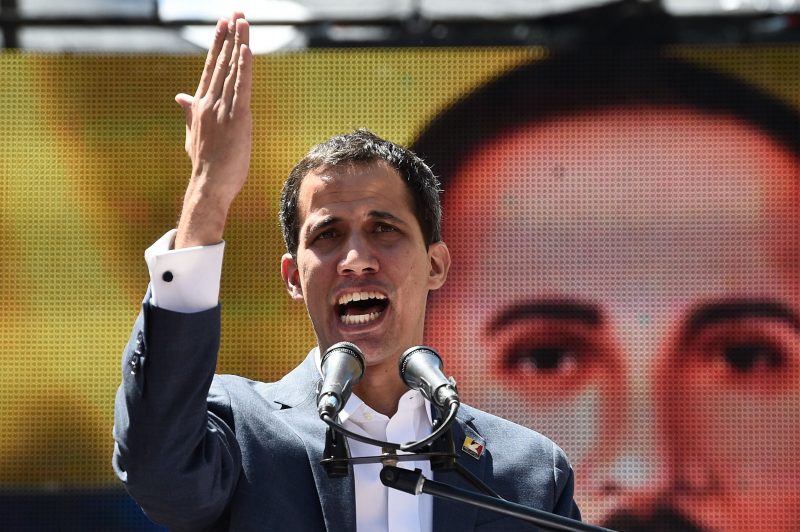Venezuela’s Guaido announces new board for key US-based oil subsidiary
Venezuelan opposition leader Juan Guaido is locked in a standoff with President Nicolas Maduro for control of the country (Federico PARRA)
Caracas (AFP) – Venezuelan opposition leader Juan Guaido Wednesday announced the appointment of a new board for Citgo, the US-based arm of state oil firm PDVSA that until recently was a major source of revenue for President Nicolas Maduro’s embattled regime.
Guaido — who has been recognized as acting president by more than 50 countries and also heads the opposition-controlled National Assembly legislature, which appointed the new board — is locked in a battle with Maduro for control of the crisis-hit country.
The United States, which is leading the push to topple Maduro, has sanctioned key regime financial assets including the Citgo subsidiary, and on Wednesday President Donald Trump once more refused to rule out military action against the leftist leader.
Announcing the new six-member board on Twitter, Guaido said it “will be made up of qualified Venezuelans, who are free of corruption and without any partisan affiliation.”
“With this decision, we are not only protecting our assets, we are avoiding the ongoing destruction and loss of the business,” said Guaido, who declared himself interim president after incumbent Maduro announced victory in polls the opposition said were rigged.
Venezuela at one point derived 96 percent of its hard currency revenues from oil exports, and the US was the biggest cash customer, buying half a million barrels per day.
In announcing the latest raft of sanctions last month, US Treasury Secretary Steven Mnuchin said Citgo can continue to operate, but its earnings must be deposited into a blocked account in the United States, out of reach of Maduro’s regime.
As the National Assembly moved to replace Citgo’s leadership, Trump was hosting Colombia’s President Ivan Duque for talks on the crisis gripping its Latin American neighbor.
Declaring himself “sad” about the “turmoil” in the oil-rich nation, Trump demanded that Maduro unblock US aid shipments to the country, sitting on the Colombian side of the border.
“You’ll see,” Trump told reporters at the White House when asked if thousands of US troops could deploy.
Duque, whose country has taken in large numbers of Venezuelan refugees, also lambasted Maduro, saying that “obstructing the access of humanitarian aid is a crime against humanity.”
The US aid has become the latest flashpoint in the international campaign to oust Maduro, whose socialist government is bolstered by the military and backed by Russia and China.
Much of Venezuela’s population is in desperate need, lacking even basics like food and medicine.
But Maduro accuses the United States of using the blocked aid shipments as pretext for an invasion.
– Country in collapse –
“I think he’s making a terrible mistake by not allowing that to happen,” Trump said of Maduro’s refusal to allow in the aid.
“We’re trying to get food to people that are starving. You have people starving in Venezuela.”
At a huge opposition rally on Tuesday, Guaido vowed that humanitarian aid would enter the country on February 23.
“We have almost 300,000 Venezuelans who will die if the aid doesn’t enter,” he added.
In his latest attempt to erode Maduro’s authority over the military, Guaido said: “Here is a direct order to the armed forces: allow in the humanitarian aid once and for all (and) end the repression.”
Guaido’s team has also met with Brazilian officials to set up a second aid storage center on that border. The new right-wing government of President Jair Bolsonaro in Brazil has joined the growing coalition against Maduro.
But Maduro has so far resisted, portraying himself in the mold of historic Latin American anti-imperialist leaders.
Moscow weighed in Tuesday, with Foreign Minister Sergei Lavrov warning “against all interference in Venezuela’s domestic affairs, including the use of force threatened by Washington.”
There have been growing rumors about possible US preparations for some kind of military involvement ever since Trump’s hawkish national security advisor John Bolton was photographed with a notepad reading “5,000 troops to Colombia?”
However, the White House has been coy about the possibility and on Wednesday, the State Department point man for Venezuela, Elliott Abrams, played down the idea.
Military intervention “is not a path that the US government is pursuing,” he said. “I don’t see a reason” for the use of force.
Venezuela has the world’s biggest oil reserves but its once-thriving economy has fallen into ruin under the long-running leftist government. Some 2.3 million people have fled since 2015, their salaries and savings rendered worthless by hyperinflation.
Disclaimer: This story is published from a syndicated feed. Siliconeer does not assume any liability for the above story. Validity of the above story is for 7 Days from original date of publishing. Content copyright AFP.


